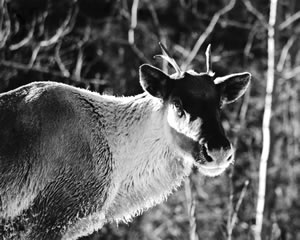Seeking sustainability in a world of instability
Seeking sustainability in a world of instability
Submitted by Marie Gilbert
Phone: 907-474-7412
02/13/08

Download photo
Seeking sustainability in a world of instability
New approaches to management of human-caribou systems
For most northern indigenous people, the roughly 3 million caribou in the world are their most important terrestrial subsistence resource, and while hunters and scientists alike have long expressed concern about the on-going availability of caribou, their perceptions of the causes of change have differed.
"For years people have managed natural resources based on their knowledge of how ecosystems have functioned in the past, which assumes conditions of equilibrium," said Gary Kofinas, a resource policy and management scientist and director of the Resilience and Adaptation Program at the University of Alaska Fairbanks.
"Today we are facing an unprecedented suite of possible changes affecting caribou and humans and with that considerable uncertainty," Kofinas said. "Under the calving grounds of the Western [Alaska] Arctic Herd is one of the largest low-sulfur coal deposits in the world. The Teshekpuk Lake area of the National Petroleum Reserve-Alaska, the calving grounds of the Teshekpuk Herd, is facing proposed oil development, and as you continue east across North America from calving ground to calving ground, you find activities or proposed activities for development of uranium and diamond mines, access roads, and other gas and oil development."
"We also find that while university researchers are focused on climate change, agency resource managers are focused on development. To understand the future of this important resource, we all need to consider how climate change will interact with human change on the landscape," Kofinas said.
Kofinas will present "Melding Social and Ecological Sustainability: Human-Caribou Systems Facing Rapid Change" at the American Association for the Advancement of Science annual meeting Sunday, Feb. 17 in Boston.
Since the 1980s, several formal community-state co-management arrangements were established, in part, to resolve historic conflicts between traditional caribou users and managers using only scientific management. Ongoing changes in climate, land use and land claims settlements are testing the effectiveness of co-management to achieve regional consensus on how best to respond.
"Groups can’t just act as individuals, and they can’t just share decision making, we need to think carefully about systems of adaptive co-management where we are challenging each other and learning from each other," Kofinas said. "If we take the idea of achieving sustainability in a world of instability seriously, we have to work toward resource management systems that facilitate a kind of social learning that brings local and traditional knowledge together with the very best science."
Kofinas and colleagues from across the North founded the CircumArctic Rangifer Monitoring and Assessment network which is a collaboration among communities, scientists and governments from across the arctic to monitor change, exchange information, compare regional differences, build decision-support tools, and report on the status and use of wild caribou across the North.
Additional information:
American Association for the Advancement of Science
Symposium: Finding sustainability without stability: New goals for a world in flux
Sunday, Feb. 17, 8:30-11:30 a.m.
Sheraton Boston, second floor
Back Bay Ballroom C
Resilience and Adaptation Program (RAP)
Institute of Arctic Biology
University of Alaska Fairbanks
www.rap.uaf.edu
CircumArctic Rangifer Monitoring and Assessment network (CARMA) www.rangifer.net/carma
Contact:
Gary Kofinas, resilience and adaptation program director, Institute of Arctic Biology; associate professor of resource policy and management, Department of Resources Management and Institute of Arctic Biology, University of Alaska Fairbanks, www.faculty.uaf.edu/ffgpk/, 907-474-7078, ffgpk@uaf.edu
Marie Gilbert, information officer, Institute of Arctic Biology, University of Alaska Fairbanks, www.iab.uaf.edu, 907-474-7412, marie.gilbert@uaf.edu


